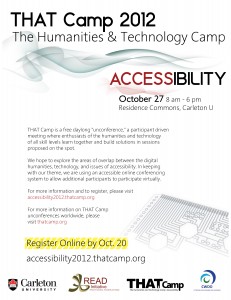Hi everyone!
We’ve got a great group of campers signed up for THATCamp Accessibility. Some session proposals are starting to come in – if you’ve got an idea of what it is you’d like to talk about or explore, please post it, no matter how nebulous! I’m hoping that there will be a session on getting started with Accessibility and Digital Technology. As one of your hosts, it has been an enormous learning curve for me personally to consider all of the various issues that come with trying to make an event fully accessible. Already, I realize just how un-accessible much of my teaching has been. Do I make pdfs that are readable by screen readers? Why don’t I record my lectures? The READ Institute has been developing a crowd-sourcing approach to screen-captioning that I hope to see demonstrated on Saturday the 27th too.
Tomorrow evening, we’ll close the registration for physical attendance of THATCamp – we have badges to make, rooms to set up, food to order, webcams and microphones to test. If you can’t make it to Carleton on the day, don’t despair! On Monday, I’ll be posting instructions on how to use our fully accessible conferencing system (provided for us courtesy of Citizens with Disabilities Ontario, to whom we are enormously grateful). On Saturday, if you follow the instructions, you can beam into one of our four ‘rooms’ to follow along, participate, and contribute to THATCamp!
What’s the difference between an ‘accessible’ conference system and say, a combination of a Google+ hangout or live blogging/tweeting etc (as THATCamp Hybrid Pedagogy is trying out)? Our system is designed to work with screen readers etc – it allows for real-time sharing of documents within that kind of environment. It will also keep an audio recording of each session (from which we hope to extract a transcript using our crowdsourcing platform, eventually). On Saturday morning, we’ll try to develop our schedule with contributions both from people on the floor and in the aether. Will it work? Well, whether it does or not, we’ll certainly learn an awful lot about how to design and run these sorts of blended events, opening up participation well beyond our walls.
Won’t you join us?
Shawn







Recent Comments